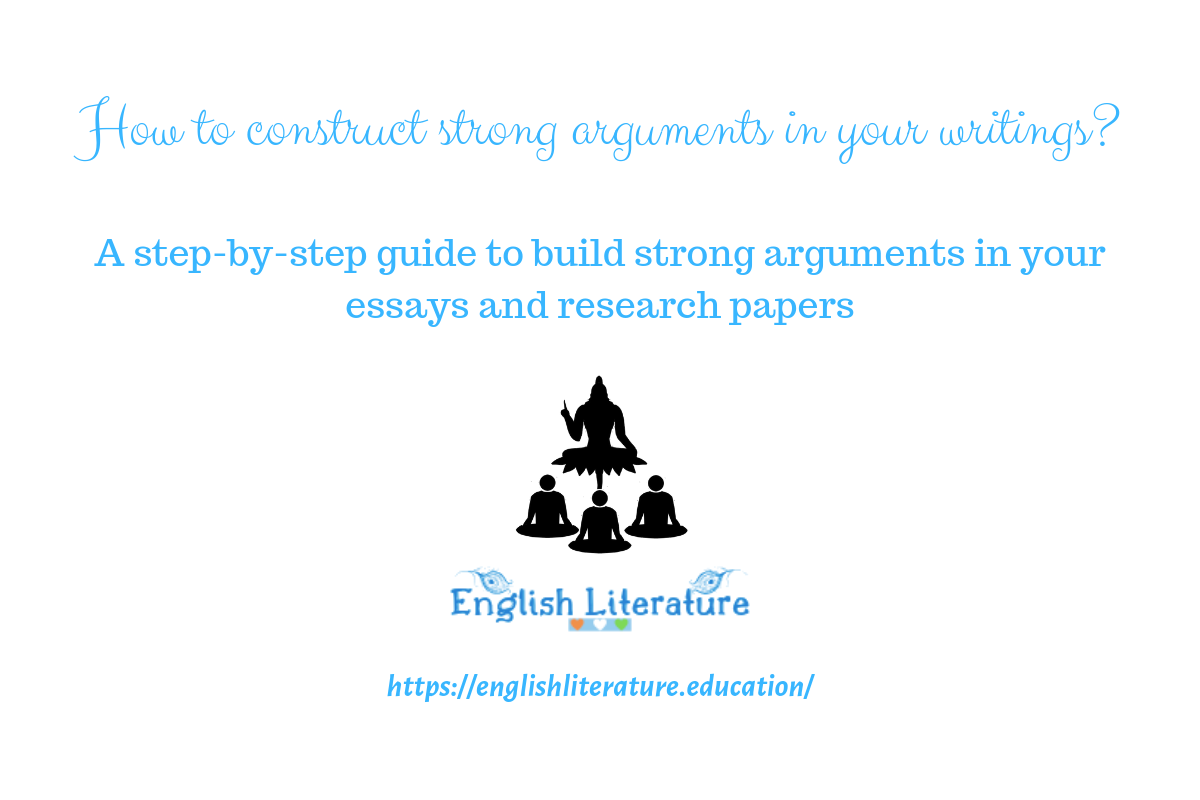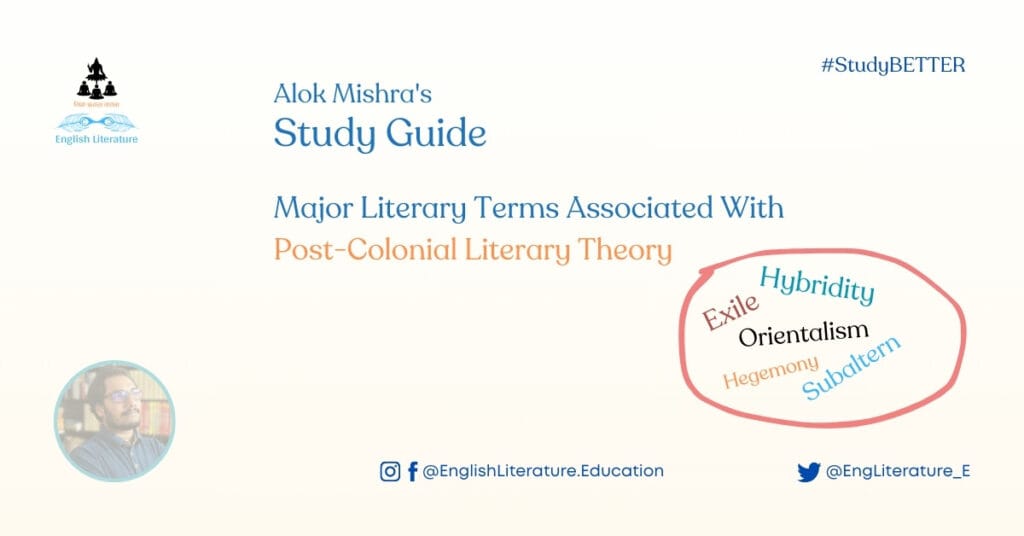One of my professors at Nalanda College (Bihar Sharif), Virendra Prasad Singh, often used to say that literature is a circle – rotate it the way you want and you will seldom fail. In those days of post-graduation, I couldn’t fathom the depth of his argument but did get a sense of it. Today, when I am writing this piece on how to build strong arguments for a literature research paper, it was necessary to recall my professor’s words because the ultimate truth is certainly what he said about literature. I cannot vouch for literature in other languages but English literature certainly stands up to that analogy. Here, if you are skilled in the skills of writing and your mind can think in many logical ways, you are the one who will construct the best and the mightiest arguments. The question is – how to do that? How to construct strong arguments in English literature papers or answers or even in your essays? Read on for the answers. We will make it a step-by-step guide like we do most of the times on the English Literature Education website.
Step 1: Think about possible (and tough) counterarguments:
Before you begin making arguments in favour of an idea or a proposition that you have thought of, do think about the counterarguments in your mind. This will enable you to think even better and will help you scrutinise your arguments on many fronts before you actually write them in your paper or your essay. I have seen many students constructing their arguments in a declining form – from weak to the weakest. This happens because, while writing, some of us tend towards making loose counterarguments in our mind or making no counterarguments at all. This enables the fallacy within our minds that we are on the winning side – save yourself from this habit and always keep thinking of counterarguments so that your critical writing will become even better. In English literature, ideas are endless and it’s way difficult to find an argument without a counterargument. Thinking so will only be foolishness! Always imagine a counterview – because it’s there. Once you find a counter view, make your arguments even stronger.
Step 2: Try to keep your arguments simple:
Simple might not look attractive but it is certainly very impactful when it comes to arguments. Keeping your arguments simple will make it sure that the readers understand your thoughts and thought-chain conveniently. However, when your ideas demand you to be crafty and complex, you are free to do so. Nevertheless, unnecessarily complicating your arguments might frustrate your readers and they might even stop reading your paper midway. So, learn when to keep things simple and when you need to be versatile. In literary essays and English literature research articles, the major arguments are drawn from your understanding and expertise in various domains – an age, a literary personality, a piece of fiction, a literary trend and so on. So, if you have the concepts clear in your mind, you can easily make it understand to your readers in a convenient manner. And it leads to the fact that in order to keep your arguments simple, clear and impactful, you need to be well-read.
Step 3: Find textual evidence to support your arguments:
Feed your arguments with credible proofs. In English literature, credible proofs are the ‘words by wise men’ we seldom know. Jokes apart, use references, borrow ideas and cite textual evidence to support your arguments so that your readers will have no option but to consider your arguments to be worthy, well-based and strong. However, at times, you might not find textual (active or passive) references to support your arguments if you are trying to argue for something that ‘scholars’ disagree. For instance, an ‘assumed interpretation’ of a poem will seldom change for the old men in business. Still, if you want to offer a new interpretation and you don’t find many credible sources to support and ‘validate’ your arguments, you will have to ‘invent’ your own forceful arguments in favour of your argument. However, if you want to do this, make sure that your supporting arguments are made on the basis of textual references from the piece you are writing about. You have to be clear about your ideas, be passionate and convinced about your assumptions and be logical with your statements. Your arguments should sound sensible, composed and impactful. To conclude this part, in either case – whether you have ‘others’ support’ or not, you have to support your arguments with textual and (or) ideological proof or (and) cover on your own.
Step 4: Present counterarguments when necessary:
Yes, it becomes important. There will be many readers of your paper, thesis or essay who will have counterarguments ready in their mind for every possible argument that you might use in your writing. However, if you present some of the most effective counterarguments in your writing by yourself, the readers will thank you. And more than that, if you can defeat those counterarguments in your paper effectively, it will also impact your readers more than just presenting your arguments only. In simple words, showing that your arguments have the upper hand in a particular battle of ideas, ideologies or assumptions, you will have to prove it by defeating some of the most-known arguments against your assumptions. If you will do that, it will convince your readers more conveniently. ‘Marlowe could be better than Shakespeare’ if he wrote more than what he wrote actually. To prove the part of the sentence which is outside the closing inverted comma, you will have to prove not only that Marlowe wrote well but also that Shakespeare’s skills (at times) come only second to Marlowe’s. To do that, you will have to argue for and against Marlowe wisely enough (and with proofs) so that you can show him winning but also keep Shakespeare side by side and try to find the arguments which praise Shakespeare but praise Marlowe more. (However, can someone seriously do that?)
Step 5: Try summing your ideas up in the conclusion with the best arguments:
Every reader will be anticipating that you actually conclude your central idea along with the sidekicks in your conclusion part. Can you do that? You have to – no options there! And to make sure you make your conclusion impactful, whole and it sums your paper up perfectly, you should use a few of your best arguments in this part of your writing. Make sure that you are convinced with those arguments and then only present it in your writing. Moreover, also ensure that these arguments are not orphan; back them up with irrefutable proofs and stronger supporting arguments so that the force of your central idea strikes the minds of your readers effectively.
At the end of all this, do remember that English literature is not a science where H2 and O will only make water. In the domain of literature, any idea can be challenged and possibly defeated as well. Therefore, you need to be prepared with the strongest possible arguments to guard your proposition. And to be able to do that, you will need to read a lot. Read analytical works by key scholars. Read some of the best history of English literature books to learn different aspects of periods in English literary history. Read commentaries by modern literary theorists to have an idea of how thoughts on the works of great figures in English literature transitioned and changed with the passage of time. Moreover, also practice writing regularly. To construct strong arguments needs practice and practice always makes men and women perfect. So, write a few pages every day.
Here are a few books that will be very helpful in understanding the art of constructing strong and persuasive literary arguments while writing essays or research papers:
Bacon’s Essays – buy from Amazon
T. S. Eliot’s Essays – buy from Amazon
Routledge History of English Literature – Roland Carter – buy from Amazon
This article is a part of our series on writing research papers and articles. Here are other useful articles you can read:





2 Comments. Leave new
This is a very wonderful article… I am about to begin my thesis. This article helped me understand the most important part. How to make arguments? Many thanks again!
The instructions given here are useful to understand the process. The tips given seems to be helpful. But I want to verify them by writing a paper myself. Thanks for the instructions.